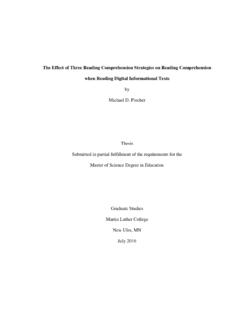Transcription of 2 Strategies for Supporting Pupils with SEN - Bradford
1 Strategies FOR Supporting Pupils WITH SEN This booklet provides support for the staff in identifying classroom-based Strategies , which may be useful in meeting Pupils needs within their lessons. It does not pretend to provide all the answers and avoids suggesting that there is only one strategy which may work. Instead it represents a range of Strategies which teachers have found helpful in range of contexts. Staff are invited to consider the Strategies given and to use those which are most relevant to the subject content, their own teaching style and the pupil s immediate needs.
2 The booklet is separated into sections. In reality these are not always discrete areas: Pupils may have a number of difficulties in a number of areas. The SEN policy will provide information on the identification and assessment procedures, triggers for school action and school action plus. Index Pupils with general learning difficulties page Pupils with general reading difficulties page Pupils with spelling difficulties page Pupils with writing difficulties page Pupils with specific learning difficulties ( dyslexia)
3 Pupils with reading difficulties Pupils with spelling difficulties Pupils with writing difficulties Pupils with handwriting difficulties Pupils with a hearing impairment Pupils with memory difficulties Pupils with poor concentration Pupils with organisational difficulties Pupils with emotional and behavioural difficulties Pupils with low self-esteem Pupils who need attention Pupils who need to be in control Pupils who feel helpless Pupils with general learning difficulties Pupils with learning difficulties have.
4 Difficulty acquiring basic literacy and numeracy skills their speech and language development may be delayed in comparison to the majority of their peers Pupils with learning difficulties will acquire and retain new concepts and ideas slowly Implications for classroom practice break lesson down into small steps ensure that written text and spoken language is appropriately differentiated to take into account the pupil's learning difficulties base teaching on everyday experiences that the Pupils will readily understand ensure that key concepts and vocabulary are revisited and reused encourage Pupils to present information in a variety of ways recognise and reinforce effort and success by rewards and praise Recommendation to support general learning difficulty: Reading.
5 Consider the possibility of paired reading at home to develop confidence maintain a reading record book that monitors the pupil's miscues and records phonic errors in word families encourage the pupil to expand his reading give technical vocabulary prior to the introduction of topics consider the readability of the text. ensure that key vocabulary is recorded on the board before reading a text differentiate texts. With textbooks check the length of sentences and the number of polysyllabic words.
6 Draw the pupil's attention to important sources of information other than the prose, maps, diagrams and photos simplify instructions, summaries or diagrams which accompany written tasks teach study skills, ways of extracting information, eg 5-point plan, highlighting and word matching, spider diagrams sequencing, highlighting and prediction Spelling: ensure that the pupil is using a multi-sensory method to learn spellings: read the word say the letters aloud, cover the word, write the word saying the letters aloud.
7 Check the word when learning spellings at home encourage the pupil to learn the spellings using the multi-sensory method and to check the words again 10 minutes later to ensure that the words go from the short term to the long term memory identify high frequency words being mis-spelt and proof read for these encourage the pupil to proof read for approximately 3 new words each week ensure that the pupil is recording own high frequency word errors use a range of ways of learning to spell words Writing.
8 Record the steps to complete a piece of work on the blackboard give explicit directions for setting work out give detailed support with planning structures encourage a variety of ways of representing information to aid processing, cartoons, pictures, diagrams give extra time to take account of slower rate of reading and writing Pupils with specific learning difficulties Pupils who have specific learning difficulties ( ) may experience any of the following problems: poor fine motor co-ordination which will result in untidy handwriting and presentation of work poor working memory, both visual and auditory, which will affect their ability to follow instructions, take down dictation, and copy text from either book or board, learn spellings or tables poor organisation which will affect their ability to remember books or equipment.
9 What homework they need to do and how to organise their thoughts into written work poor sequencing skills which can affect their ability to learn tables or spellings typically they are Pupils who learn some things easily while other aspects of their work present them with persistent difficulties. they will often be able to make valuable contributions to class discussions but find it difficult to present those ideas in the written form. written work will often have taken these Pupils much longer to complete than a similar piece written by their peers, or be incomplete.
10 The completed work often has a significantly restricted vocabulary when compared to the pupil's oral vocabulary. These problems can lead to frustration, poor self-image and sometimes result in behaviour problems. Implications for classroom practice where there are fine motor problems encourage the use of ICT recognise that effort will not reflect output. Work may often be incomplete, or when complete, may be the result of substantial extra time and effort on the pupil's part. to avoid unfinished work help the pupil to complete core elements of the work if copying from the board or dictating, allow the pupil additional time and speak more slowly to accommodate the pupil with a short working visual or auditory memory use techniques which require greater interaction with the text but require less recording, cloze , sequencing or prediction tasks if a pupil reads very slowly then encourage them when researching.






